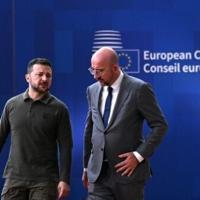Leaders of the European Union reached a summit agreement on Thursday to reappoint Ursula von der Leyen as the head of the European Commission, and appoint Estonia’s Prime Minister Kaja Kallas as the bloc’s top diplomat.
The agreement, made late at night, distributes the top institutional positions of the EU for the next five years, with former Portuguese Prime Minister Antonio Costa set to lead the European Council that brings together member states.
All three nominees come from the centrist alliance that dominates the EU parliament, despite gains made by far-right parties in the recent elections, including Italy’s Giorgia Meloni, who publicly opposed the arrangement of top positions.
While Costa, aged 62, will automatically take over from Council President Charles Michel this year, von der Leyen, 65, and Kallas, 47, must secure majority support in the European Parliament, starting with a vote in July for the commission chief, which is expected to be close.
If confirmed, von der Leyen, who faced multiple crises during her first term from the Covid pandemic to the Ukraine war, will now face new challenges such as the Russian threat, climate change, and the rise of China.
Von der Leyen expressed her “gratitude” to the leaders in Brussels for supporting her for a second term, and stated that she would soon outline her political priorities to gain the confidence of the parliament.
Costa, committed to promoting unity among member states, emphasized the resilience of the European Union in addressing challenging moments.
Kallas, recognizing the enormous responsibility she had been given, highlighted the acute geopolitical tensions facing Europe and the world at large.
The final lineup was not a surprise, as an inner group of leaders had already agreed on the names of the three nominees days earlier, in contrast to the dramatic selection process that occurred in 2019 when von der Leyen emerged following a backroom deal.
The agreement distributes the posts among von der Leyen’s European People’s Party (EPP), Costa’s Socialists and Democrats (S&D), and Kallas’s Renew Europe.
German Chancellor Olaf Scholz praised the swift and forward-looking decisions regarding the top positions, stating that the nominees would ensure a strong European position in the years ahead.
– ‘Wrong in method’ –
With France holding elections on Sunday, where the far-right National Rally has a chance of leading the government, there was a clear urgency to finalize the EU jobs.
Despite the centrists’ strong position, there was little desire to rush a deal without consensus, as seen when Hungarian leader Viktor Orban criticized the process as deceptive to European voters, but was unable to prevent the agreement from moving forward.
Leaders focused on gaining support from Italy’s Meloni, who had reservations about the deal-making process and believed that Italy’s influence in the EU should be reflected in the leadership roles.
In the end, Meloni abstained from the vote for the commission chief and voted against Costa and Kallas, stating that the deal was flawed in both method and substance.
She expressed her commitment to working towards giving Italy the influence it deserves in Europe.
ec/del/dhw





